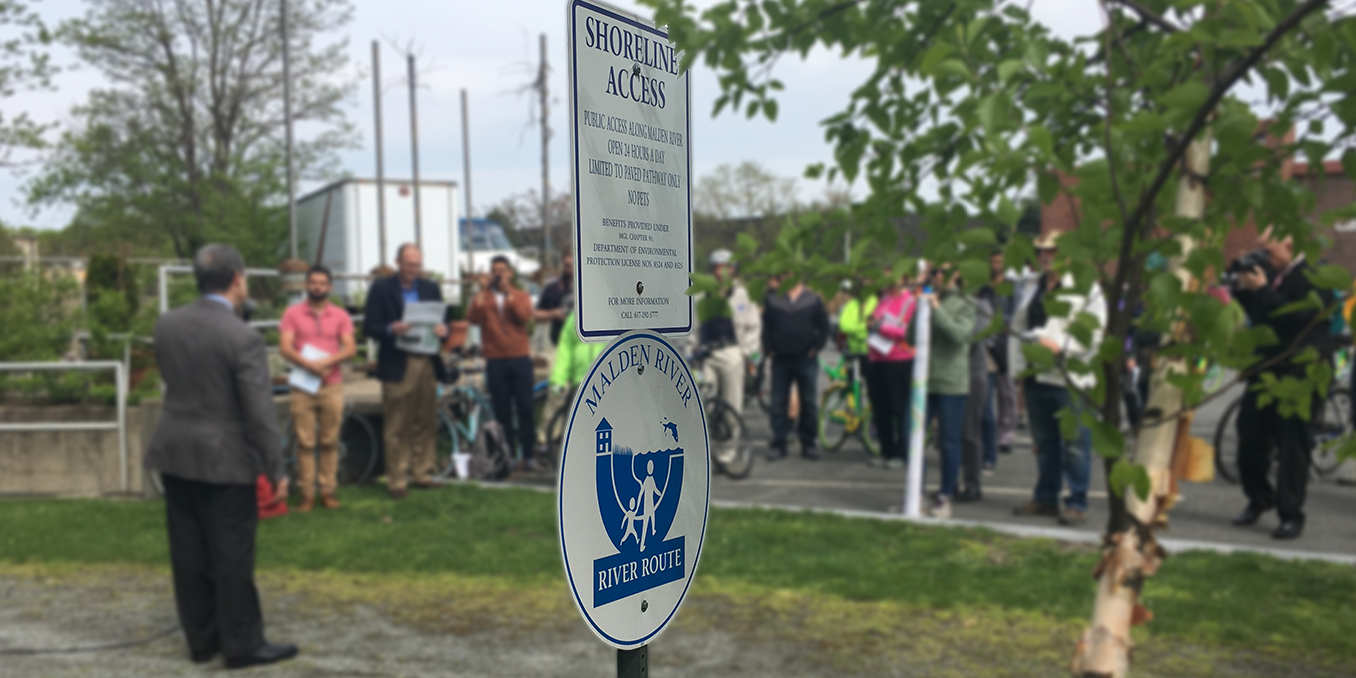
MAPC
Smart Growth & Regional Collaboration
2019-2020
Malden River
Creative Placemaking
After 150 years of industrial development that obscured access to the Malden River, city leaders identified the need to "develop the Malden River as new open space" as a top priority in the city's 2017 Open Space and Recreation Plan.
From the 1990s to the present, the City of Malden, the neighboring municipalities of Medford and Everett, community-based advocacy organizations, and private developers have created projects and plans that address the different conditions that impact the river. Recognizing the need to synthesize these individual efforts into a comprehensive strategy and engage the public in shaping the results, the City engaged MAPC in 2019 to provide technical assistance for a creative placemaking project.
The project developed a temporary placemaking installation to bring people to the river, experience the public space that already exist, and help them imagine a future where the entire riverfront landscape could become accessible to the public. All events were free, and invitations were translated into the languages of their target audiences.
The project culminated with a public boating event at the Malden Department of Public Works and the installation of a semi-permanent outdoor exhibit with visioning graphics and text that is translated into five commonly-spoken languages in the city.
The project aimed to spark interest among elected and appointed officials and build public support for changes to zoning and other policies that will help create an improved, activated, welcoming waterfront.
Why It's Important
This project allowed the team to develop a creative placemaking approach that reflected the mission of the agency, the values of the Arts & Culture Department, and the shared history of the Malden community in service of the City’s larger planning and revitalization goals.
Download the Report
The final report includes: a project overview, description of community goals, exiting conditions review, creative placemaking description, vision for the future, and recommendations.
Recommendations:
MAPC's report makes recommendations for how the City of Malden can create opportunities for river access, including:
- Revisit zoning bylaws for industrial uses abutting the river and establish a rear setback and minimal useable open space requirements to reserve land for three elements of a healthy and accessible riverfront: ecological restoration and conservation, a public path for pedestrians and cyclists, and public amenities.
- Improve the health of the river by creating policies that will limit land-based sources of pollution from entering the water.
- Continue to expand public-private partnerships between the City, MRA, FoMR, MyRWA, GMAAC, CCC, as well as community Interpreters and others to keep Malden’s diverse communities informed and involved in the vision for a safe, inclusive, arts-infused, accessible riverfront in Malden.
BACKGROUND
The Malden River is 2.3 miles long and flows through Malden, Medford, and Everett, where it converges with the Mystic River before exiting into Boston Harbor. It was formerly a meandering brackish stream influenced by the tides, so many of the parcels along the river are subject to the Massachusetts Public Waterfront Act, Chapter 91. However, knowledge of the potential for enhanced public benefits in this area is obscured because of a lack of common knowledge about the law, and the immense physical changes that have occurred along the river.
Industrialization followed the rail lines that were constructed on either side of the area by the mid-19th century. The river was channelized, and its tributaries were buried underground. Since 2017, three studies have been conducted by the City of Malden which have all identified the Malden River as a place with the potential for increased public access. These studies are:
- Commercial Street Corridor Framework Plan, 2018
- Malden Open Space and Recreation Plan, 2017
- Malden River Vision Plan, 2017
QUESTIONS?
For more information about the project, contact Arts & Culture Director Annis Sengupta at asengupta@mapc.org.

